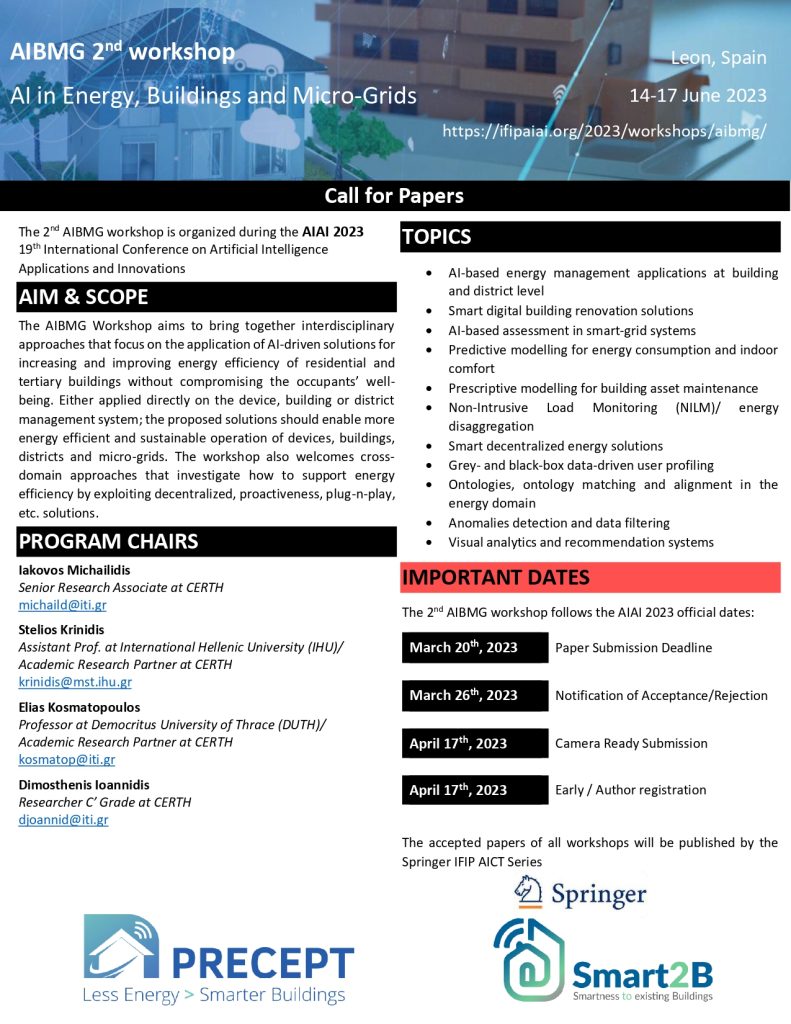AIBMG
The 2nd Workshop on
AI in Energy, Buildings and Micro-Grids Workshop (ΑΙBMG)
Sustainable energy is hands down one of the biggest challenges of our times. As the EU sets its focus to reach its 2030 and 2050 goals, the role of artificial intelligence in the energy domain at building, district and micro-grid level becomes prevalent. The EU and member states are increasingly highlighting the need to complement IoT capacity (e.g. appliances and meters) with artificial intelligence capabilities (e.g. building management systems, proactive optimization, prescriptive maintenance, etc.). Moreover, moving away from the centralized production schema of the grid, novel approaches are needed for the optimal management / balancing of local (or remote aggregated net metering) generation and consumption rather than only reducing energy consumption for presuming communities.
The AIBMG Workshop aims to bring together interdisciplinary approaches that focus on the application of AI-driven solutions for increasing and improving energy efficiency of residential and tertiary buildings without compromising the occupants’ well-being. Either applied directly on the device, building or district management system; the proposed solutions should enable more energy efficient and sustainable operation of devices, buildings, districts and micro-grids. The workshop also welcomes cross-domain approaches that investigate how to support energy efficiency by exploiting decentralized, proactiveness, plug-n-play, etc. solutions.
Organizing Committee
- Dr. Iakovos Michailidis, Centre for Research and Technology Hellas (CERTH), Greece.
- Prof. Stelios Krinidis, International Hellenic University (IHU)/ Centre for Research and Technology Hellas (CERTH), Greece.
- Elias Kosmatopoulos, Democritus University of Thrace (DUTH)/ Centre for Research and Technology Hellas (CERTH), Greece.
- Dimosthenis Ioannidis, Centre for Research and Technology Hellas (CERTH), Greece.
Program Committee
- Giorgos Karatzinis, Centre for Research and Technology Hellas (CERTH), Greece
- Giorgos Vougiatzis, Centre for Research and Technology Hellas (CERTH), Greece
- Aliki Stefanopoulou, Centre for Research and Technology Hellas (CERTH), Greece
- Napoleon Bezas, Centre for Research and Technology Hellas (CERTH), Greece
- Asimina Dimara, Centre for Research and Technology Hellas (CERTH), Greece
- Alexis Papaioannou, Centre for Research and Technology Hellas (CERTH), Greece
- Paraskevas Koukaras, Centre for Research and Technology Hellas (CERTH), Greece
Topics of interest of AIBMG include (but are not limited to):
- AI-based energy management applications at building and district level
- Smart digital building renovation solutions
- AI-based assessment in smart-grid systems
- Predictive modelling for energy consumption and indoor comfort
- Prescriptive modelling for building asset maintenance
- Non-Intrusive Load Monitoring (NILM)/ energy disaggregation
- Smart decentralized energy solutions
- Grey- and black-box data-driven user profiling
- Ontologies, ontology matching and alignment in the energy domain
- Anomalies detection and data filtering
- Visual analytics and recommendation systems
Important dates
Please visit AIAI 2023 important dates to be informed about the submission deadlines.
Submission instructions
Submission details can be found at AIAI conference submission page.
All papers should be submitted either in a doc/docx or in a pdf form and will be peer reviewed by at least 2 academic referees. Contributing authors must follow the AIAI2023’s paper format guidelines as far as the IFIP AICT file format.
Papers will be peer reviewed by at least two (-2-) members of the workshop’s program committee.
Accepted papers will be published in the Proceedings of AIAI VOLUME 2, under the Springer IFIP AICT Series.
You can submit you ΑΙBMG paper here http://www.easyacademia.org/aiai2023.
Poster

This Workshop is co-funded by the European Union’s Horizon 2020 research and innovation programme under the projects PRECEPT (grant agreement No 958284) and SMART2B (grant agreement No 101023666).